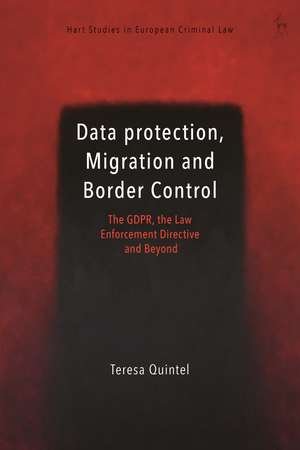Data Protection, Migration and Border Control: The GDPR, the Law Enforcement Directive and Beyond: Hart Studies in European Criminal Law
Autor Teresa Quintelen Limba Engleză Paperback – 15 mai 2024
| Toate formatele și edițiile | Preț | Express |
|---|---|---|
| Paperback (1) | 299.01 lei 6-8 săpt. | |
| Bloomsbury Publishing – 15 mai 2024 | 299.01 lei 6-8 săpt. | |
| Hardback (1) | 540.96 lei 6-8 săpt. | |
| Bloomsbury Publishing – 16 noi 2022 | 540.96 lei 6-8 săpt. |
Din seria Hart Studies in European Criminal Law
-
 Preț: 147.01 lei
Preț: 147.01 lei - 28%
 Preț: 374.46 lei
Preț: 374.46 lei - 22%
 Preț: 264.45 lei
Preț: 264.45 lei -
 Preț: 306.94 lei
Preț: 306.94 lei - 30%
 Preț: 607.18 lei
Preț: 607.18 lei - 30%
 Preț: 567.99 lei
Preț: 567.99 lei - 18%
 Preț: 322.33 lei
Preț: 322.33 lei - 34%
 Preț: 511.97 lei
Preț: 511.97 lei - 18%
 Preț: 322.80 lei
Preț: 322.80 lei - 22%
 Preț: 272.23 lei
Preț: 272.23 lei - 22%
 Preț: 270.57 lei
Preț: 270.57 lei - 18%
 Preț: 322.60 lei
Preț: 322.60 lei - 30%
 Preț: 571.66 lei
Preț: 571.66 lei - 27%
 Preț: 409.90 lei
Preț: 409.90 lei - 30%
 Preț: 835.93 lei
Preț: 835.93 lei - 22%
 Preț: 257.97 lei
Preț: 257.97 lei - 18%
 Preț: 306.94 lei
Preț: 306.94 lei - 18%
 Preț: 308.74 lei
Preț: 308.74 lei - 18%
 Preț: 306.47 lei
Preț: 306.47 lei - 18%
 Preț: 323.84 lei
Preț: 323.84 lei - 22%
 Preț: 273.06 lei
Preț: 273.06 lei - 18%
 Preț: 300.98 lei
Preț: 300.98 lei - 18%
 Preț: 299.55 lei
Preț: 299.55 lei - 28%
 Preț: 466.81 lei
Preț: 466.81 lei
Preț: 299.01 lei
Preț vechi: 365.47 lei
-18% Nou
Puncte Express: 449
Preț estimativ în valută:
57.21€ • 59.90$ • 47.34£
57.21€ • 59.90$ • 47.34£
Carte tipărită la comandă
Livrare economică 05-19 aprilie
Preluare comenzi: 021 569.72.76
Specificații
ISBN-13: 9781509959679
ISBN-10: 150995967X
Pagini: 288
Dimensiuni: 156 x 234 x 25 mm
Greutate: 0.4 kg
Editura: Bloomsbury Publishing
Colecția Hart Publishing
Seria Hart Studies in European Criminal Law
Locul publicării:London, United Kingdom
ISBN-10: 150995967X
Pagini: 288
Dimensiuni: 156 x 234 x 25 mm
Greutate: 0.4 kg
Editura: Bloomsbury Publishing
Colecția Hart Publishing
Seria Hart Studies in European Criminal Law
Locul publicării:London, United Kingdom
Caracteristici
Pays particular attention to managing migration flows, a core law enforcement activity
Notă biografică
Teresa Quintel is Assistant Professor at the Maastricht European Centre on Privacy and Cybersecurity, the Netherlands.
Cuprins
Introduction: The Emergence of Multiple Function Creeps 1. The Developments Towards the Area of Freedom, Security and Justice and the Right to the Protection of Personal Data I. Processing of Personal Data in the Law Enforcement ContextII. The Growth of Powers of the EU Agencies III. The Case of EU Databases IV. Conclusion 2. The End of Purpose Limitation I. Interoperability in a Nutshell II. Interoperability as a Logical Step III. Law Enforcement Access to the Interoperability ComponentsIV. Law Enforcement Access in Light of Article 52(1) of the EU Charter V. Access to the Interoperability Components by the Relevant EU Agencies VI. Supervision of Processing within the Interoperable System VII. Conclusion 3. The Overly Broad Application of Directive (EU) 2016/680 I. Directive (EU) 2016/680: Structure and Overview II. Specific Rules under Directive (EU) 2016/680 for Data Protection in the Law Enforcement Context III. Scoping Exercise: The Scope of Application of Directive (EU) 2016/680 IV. Provisions Specifically Designed for the Processing of Personal Data in the Law Enforcement Context V. Data Subject Rights VI. Obligations for Controllers and Security of Personal Data VII. International Transfers of Personal Data VIII. The Role of Data Protection Supervisory AuthoritiesIX. Existing EU Legal Acts and Commission Reports X. Conclusion 4. The Blurred Line between EU Law Enforcement Agencies and EU Migration Agencies I. Overview of the Respective Agencies II. Access to EU Databases and the Interoperability Components by EU Agencies III. The Fragmentation of Applicable Data Protection Rules IV. Chapter IX of Regulation (EU) 2018/1725 on Operational Personal Data V. The European Border and Coast Guard Agency Processing Personal Data: The Extended Mandate under the 2019 Regulation VI. Europol and Eurojust: Solutions after the Adoption of Regulation (EU) 2018/1725 VII. Conclusion Concluding Remarks I. Outlook
